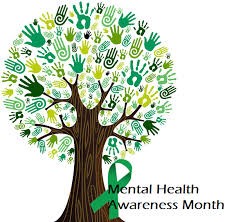MEND CORNER: May is Mental Health Awareness Month
MEND CORNER: May is Mental Health Awareness Month
May 3, 2018
 During the month of May, MEND and the rest of the country are raising awareness for mental health issues. According to the National Alliance on Mental Illness, approximately 1 in 5 adults in the U.S. (43.8 million or 18.5%) experience mental illness in a given year, and approximately 1 in 5 youths, ages 13-18, experience a severe mental disorder at some point during their lives. Unfortunately, many do not seek treatment and ultimately go untreated because mental illness is often stigmatized and misunderstood by society. By bringing more awareness to this issue, our hope is that more people will feel encouraged to seek treatment from a mental health professional.
During the month of May, MEND and the rest of the country are raising awareness for mental health issues. According to the National Alliance on Mental Illness, approximately 1 in 5 adults in the U.S. (43.8 million or 18.5%) experience mental illness in a given year, and approximately 1 in 5 youths, ages 13-18, experience a severe mental disorder at some point during their lives. Unfortunately, many do not seek treatment and ultimately go untreated because mental illness is often stigmatized and misunderstood by society. By bringing more awareness to this issue, our hope is that more people will feel encouraged to seek treatment from a mental health professional.
To begin our discussion on mental health awareness, let’s take a look at some of the general symptoms that an individual with a mental illness may experience:
- Changes in eating/sleeping habits
- Mood swings
- Withdrawal and/or isolation
- Excessive worrying
- Changes in work/academic performance
- Hyperactivity
- Suicidal thoughts
- Self-injurious behaviors and self-medicating
Now, let’s take a look at some specific examples of disorders and their associated symptoms.
Anxiety Disorders:
Include Obsessive-Compulsive Disorder (“OCD”), Panic Disorders, and Phobias.
Symptoms: May respond to certain objects or situations with fear and dread, breathing difficulties, dizziness, and nervousness.
Mood Disorders:
Include Depressive Disorder, Bipolar Disorder, and Seasonal Affective Disorder (“SAD”).
Symptoms: Persistent feelings of sadness and hopelessness, feelings of euphoria, and feelings that fluctuate between euphoria and sadness; can also lead to suicidal thoughts and gestures.
Trauma and Stress Related Disorders:
Post-Traumatic Stress Disorder (“PTSD”) is a mental health problem that some people develop after experiencing or witnessing a life-threatening event, like combat, a natural disaster, a car accident, or sexual assault.
Symptoms: Depression, fear, nightmares, and physical malaise.
Psychotic Disorders:
Include Schizophrenia, Substance-Induced Psychotic Disorder, and Delusional Disorder.
Symptoms: Hallucinations, disorganized thoughts, and delusions.
Mental illness is no different than someone who is sick and seeking help from a medical doctor. There are professionals and various treatment options available to help. The first and most important step is reaching out and asking for help.
If you or an eligible dependent is struggling with a substance abuse disorder or need a mental health referral, please contact the MEND Program at (212) 366-7590 or by email at Mend@nyccbf.org.
Below are some additional resources:
- www.mentalhealth.gov
- www.nami.org (National Alliance on Mental Illness)
- www.MentalHealthAmerica.net or 1(800) 273- TALK (8255)
- For Veterans Press 1, Text to 838255, or go to www.veteranscrisisline.net
- For National Suicide Prevention, you can call the above number or go to www.suicidepreventionlifeline.org







